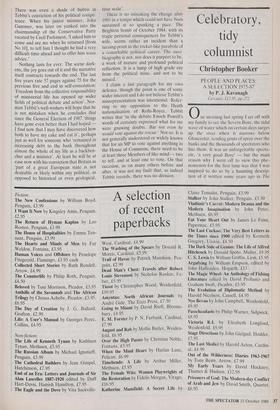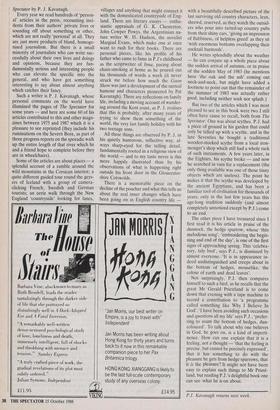Celebratory, tidy columnist
Christopher Booker
PEOPLE AND PLACES: A SELECTION 1975-87 bil). J. Kavanagh
Canattet, £12.95, pp.2 72
0 Ile morning last spring I set off with my family to see the Severn Bore, the tidal wave of water which on certain days surges up the river when it narrows below Gloucester, sending gouts of spray over the banks and the thousands of spectators who line them. It was an unforgettable specta- cle, 'a very good Bore' - but the main reason why I went off to view this phe- nomenon for the first time was that I was inspired to do so by a haunting descrip- tion of it written some years ago in The Spectator by P. J. Kavanagh.
Every year we read hundreds of 'person- al' articles in the press, recounting inci- dents from their authors' private lives or sounding off about something or other, which are not really 'personal' at all. They are just more products of bland, homoge- nised journalism. But there is a small minority of journalists who can write suc- cessfully about their own lives and doings and opinions, because they are fun- damentally serious and interesting people who can elevate the specific into the general, and who have got something interesting to say about almost anything which catches their fancy.
Such a writer is P. J. Kavanagh, whose personal comments on the world have illumined the pages of The Spectator for some years — and here are some 60 of his articles contributed to this and other maga- zines between 1975 and 1987 which it is a pleasure to see reprinted (they include his ruminations on the Severn Bore, as part of three progress reports on the sporadic walk up the entire length of that river which he and a friend hope to complete before they are in wheelchairs).
Some of the articles are about places — a splendid account of a ramble around the wild mountains in the Corsican interior; a quite different guided tour round the geys- ers of Iceland with a group of camera- clicking French, Swedish and German tourists; an eerie walk through the New England 'countryside' looking for lanes,
villages and anything that might connect it with the domesticated countryside of Eng- land. There are literary essays — enthu- siastic appraisals of G. K. Chesterton, John Cowper Powys, the Argentinian na- ture writer W. H. Hudson, the novelist Margiad Evans, which make one at once want to rush for their books. There are personal pieces, like his profile of his father who came to fame in P.J's childhood as the scriptwriter of Itma, pacing about chain-smoking at home as he poured out his thousands of words a week (it never struck me before how much the Goon Show was just a development of the surreal humour and characters pioneered by Pat Kavanagh). There are reflections on family life, including a moving account of wander- ing around the Kent coast, as P. J. realises that this is probably, after many years of trying to show them something of the world, the very last family holiday with his two teenage sons.
All these things are observed by P. J. in his quietly humorous, reflective way, al- ways sharp-eyed for the telling detail, fundamentally rooted in a religious view of the world — and to my taste never is this more happily illustrated than by his observations of what is happening right outside his front door in the Gloucester- shire Cotswolds.
There is a memorable piece on the decline of the poacher and what this tells us about the real inner changes which have been going on in English country life — with a beautifully described picture of the last surviving old country characters, lean, shrewd, reserved, as they watch the outsid- ers who pour into tarted-up country pubs from their shiny cars, 'giving an impression of flabbiness, of helpless greed' as they sit 'with enormous bottoms overlapping their cocktail barstools'.
He writes splendidly about the weather — he can conjure up a whole piece about the sudden arrival of autumn, or in praise of the sodden May of 1983 (he mentions here 'the oak and the ash' coming out neck-and-neck, but might have added a footnote to point out that the remainder of the summer of 1983 was actually rather good, including neither soak nor splash.) But two of the articles which I was most pleased to see in this book were two I still
often have cause to recall, both from The Spectator. One was about scythes. P.J. had a piece of ground in his garden that could
only be tidied up with a scythe, and in the late Seventies he bought a traditional wooden-stocked scythe from a local iron- monger's shop which still had a whole rack of such instruments. A few years later, in the Eighties, his scythe broke — and now he searched in vain for a replacement (the only thing available was one of those tinny objects which are useless). The point he makes it that the scythe was developed by the ancient Egyptians, and has been a familiar tool of civilisation for thousands of years; only in the last few years has this age-long tradition suddenly (and almost completely unnoticed except by P.J.) come to an end.
The other piece I have treasured since I first read it is his article in praise of the dunnock, the hedge sparrow, whose 'thin melodious song', 'embroidering the begin- ning and end of the day', is one of the first signs of approaching spring. This 'celebra- tory, tidy bird', says P.J., is dismissed by almost everyone. 'It is in appearance in- deed undistinguished and creeps about in the bottom of hedges, mouselike, the colour of earth and dead leaves'.
Not surprisingly, P.J. then compares himself to such a bird, as he recalls that the great Mr Gerald Priestland is to come down that evening with a tape machine to record a contribution to 'a programme called something like Why I Believe In God'. 'I have been avoiding such occasions and questions all my life' says P.J., 'prefer- ring to roam the bottom of hedges, dun- coloured'. To talk about why one believes in God, he goes on, is a kind of imperti- nence. How can one explain that it is a feeling, not a thought — 'that the feeling is precise, but cannot be precisely expressed', that it has something to do with the
pleasure he gets from hedge sparrows, that it is the pleasure? It might not have been
easy to explain such things to Mr Priest- land, but reading P.J.'s delightful book one can see what he is.on about.
P.J. Kavanagh returns next week.



























































 Previous page
Previous page